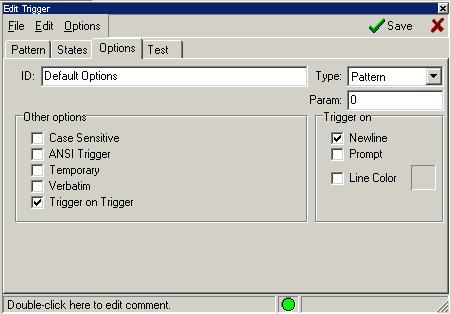Trigger Options Tab
[Pattern tab] [States tab] [Options tab] [Testing tab] [Trigger Patterns]
This Settings Editor dialog page allows you to edit the properties of a Trigger.

The ID field is used to assign a short name to this trigger. This short name can be used with the #T+ and #T- commands to enable and disable the trigger, and is very useful for #STATE and #SET when working with multistate triggers.
Normally, triggers are set to a Type of Pattern which indicates that the trigger should fire when the pattern of text is received from the MUD.
There is a page for detailed descriptions of all other Trigger Types, and brief descriptions can be found on the Trigger Command Options page.
The Trigger On options determines whether the trigger pattern is detected at the end of each line (Newline), or after a full buffer of text is received from the MUD (Prompt). You can select both if necessary, but this may cause a trigger to fire twice in some circumstances.
You can specify the color required for the first character of the line from the MUD by selecting Line Color and then clicking on the color box to the right. Select the color combination required to fire this trigger.
The Other Options area allows setting
Case Sensitive Determines whether the pattern matching is case sensitive or not.
ANSI Trigger Turn this option on to allow patterns to contain ANSI color sequences. An ANSI color sequence looks like %e[xxm where xx is the ANSI color value. To trigger on specific color patterns, turn this option on, select the line from the MUD output window that contains the pattern you want to match, and paste (Ctrl-V) this line into the trigger pattern field. If the Ansi Trigger option was on when you pasted the line, any ANSI color codes will be pasted into the Pattern field along with the rest of the text.
Temporary The trigger is temporary and will be deleted after it is executed once. Temporary triggers are not saved to your settings file. Scriptwise this option is only set by the
#TEMP command.
Verbatim Tells zMUD to match the pattern verbatim without parsing any special
pattern characters or wildcards in the pattern.
Trigger on Trigger When on, zMUD executes trigger matching on any output displayed by this trigger. Care should be used with this option to avoid an infinite loop of trigger matching.
